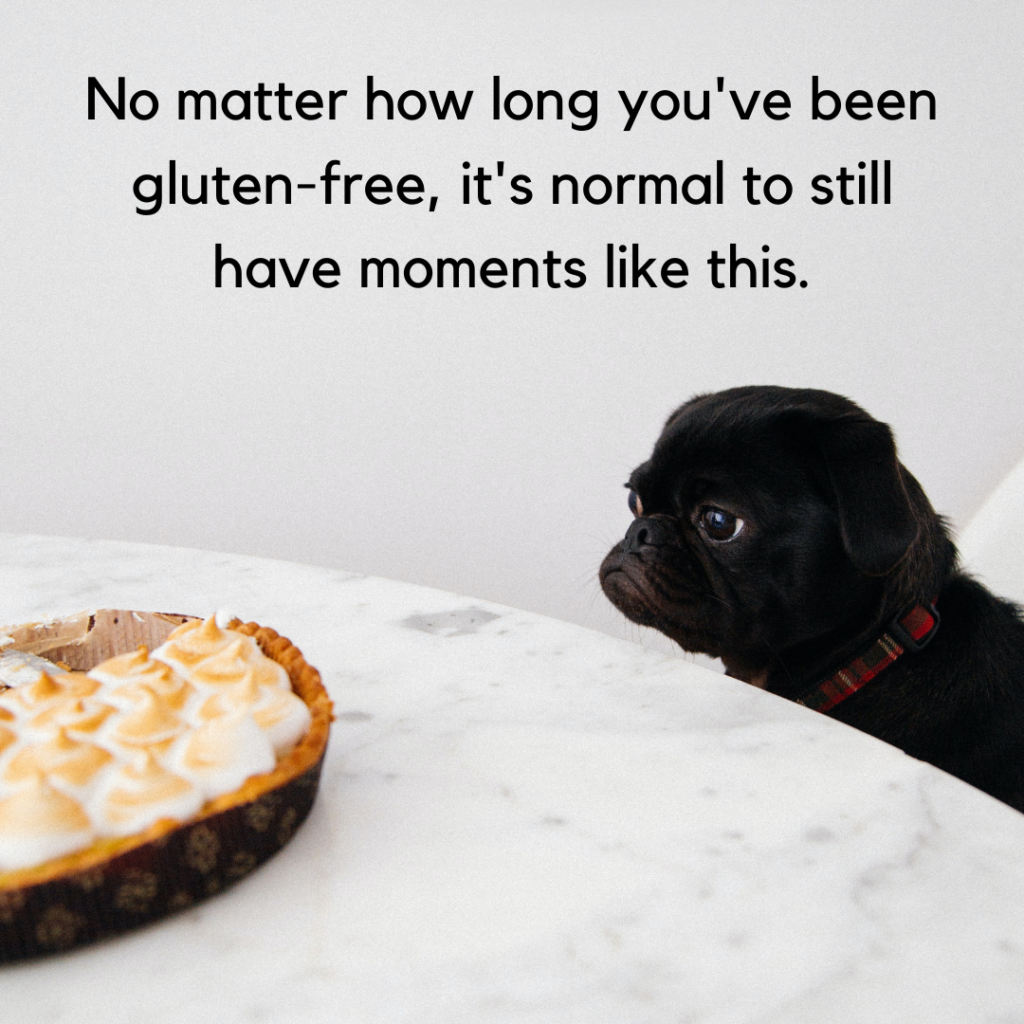
It’s completely normal to go through a grieving process when you find out you have to give up gluten. There are endless emotions and memories wrapped up in food, and finding out you have to eliminate one forever isn’t always simple. There might be some crying, some yelling, some hiding under the covers… that’s ok.
Even years later, you may cross paths with your old favorite gluten-containing food and be hit with a wave of nostalgia. The holiday season in particular can stir this up as we go to family gatherings and parties where we come face-to-face with our grandmother’s sugar cookies that we ate growing up and all sorts of other foods that represent another time and place in our lives.
The majority of the time, I’m pretty content with my diet as it is now, and there are many great GF alternatives that can fulfill cravings for pasta, pizza, etc., but even I still have occasional moments where I long for the gluten-containing original from the past.
Those of us who find out we have to go gluten-free for life may go through a general pattern of “Five Stages of Grief” similar to other losses. Sometimes these don’t occur in order, and some may never happen at all. Often we find ourselves revisiting stages even far after we’ve thought we’ve gone through them. Perhaps some of this will sound familiar:
- Denial: When you’re shocked about your diagnosis and the lifestyle changes that it implies, the first reaction may be. “This couldn’t possibly be happening to me. Is this a false positive?” or “There’s no way I’m able to give up ALL that.”
- Anger: You may feel resentful and angry with friends or family who do not have celiac, do not have to live with any restrictions, and for being either insensitive or merely unable to ever fully understand what you’re going through. You may feel angry at your body or feel betrayed by it for developing a disease. You may feel frustrated about the whole damn situation for making life feel so complicated.
- Bargaining: This stage is often characterized by guilt or self-blame. Questions may arise such as, “what if I had taken better care of myself?” or “what if I had managed my stress better, would this still have happened to me?” Personally, this is a stage I have spent much time in, contemplating the factors that can cause celiac and what I could have done differently to prevent it from being triggered. Eventually I learned this is a waste of time and that it’s more constructive to move forward than live in the past.
- Depression: This typically occurs when the reality of your condition and the diet and lifestyle change set in. It’s common to feel isolated and immobilized by overwhelm and confusion around going gluten-free and handling social situations. And, it can be hurtful if people who you expected to support you do not.
- Acceptance: No one’s expecting you to ever be THRILLED about having to say good-bye to gluten forever, but Acceptance isn’t about that. This is the stage where you start to feel okay with your celiac or gluten-sensitivity, knowing that life will go on and you’re going to try your darndest to make the best out of it. You start to gravitate towards the people that truly support you, and you find that you have far more good days than hard days.
What stage(s) have you been going through most lately? Know that you deserve to take the time and space to process these emotions, and be kind to yourself in the process.

Also know there are things that help! Here are the top 3, all of which are covered in depth in my Gluten-Free Jumpstart Program:
- Learning HOW to navigate a gluten-free diet and lifestyle and what it looks like to eat, live, work and play gluten-free minimizes the overwhelm and confusion, which can underlie stages such as depression and anger.
- Feeling better. The better you feel, the more evidence you have for WHY you should be GF, and the more quickly you can accept this.
- Finding support, both through community and a healthcare team that listens and understands you. You’re not doing this alone (literally there are millions of people in the world going through the same thing), so you don’t have to feel alone!
These three things can help you reach an additional (bonus!) stage past Acceptance, which I’m calling THRIVING. You may start feeling better than before diagnosis, discovering new delicious foods, having even a smidgen of gratitude for what it’s taught you, and appreciating the new perspective celiac has given you on your health. Celiac often acts as an impetus for self-discovery, and many find that, with time and support, they become more confident in themselves than before.

